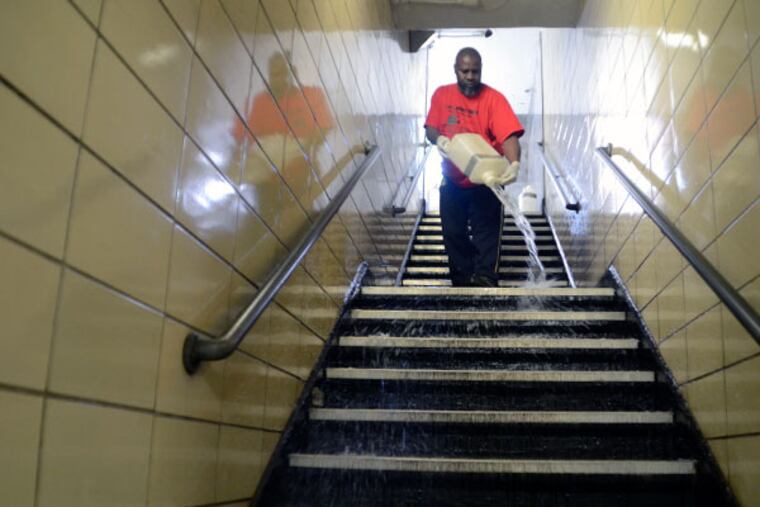Along gritty subway concourses, 11 jobs at stake
The 11 workers who clean the gritty subway concourses under Center City fear that they will lose their jobs when SEPTA takes control of the miles of concourses from the city on July 1.

The 11 workers who clean the gritty subway concourses under Center City fear that they will lose their jobs when SEPTA takes control of the miles of concourses from the city on July 1.
The workers, who do the dirty work of cleaning up after nighttime revelers and homeless people before the morning rush of commuters, work for a janitorial company that is a subcontractor for the Center City District.
Under a contract approved last month, the city - owner of the concourses - and the CCD will relinquish responsibility for cleaning, maintenance, and repairs to SEPTA. The CCD has cleaned the concourses since 2007.
The new 30-year lease with the city gives SEPTA responsibility for the 3.5 miles of city-owned concourses along Market Street from Eighth to 18th Streets and south to the Walnut-Locust subway station, as well as the elevators and escalators that serve the Broad Street and Market-Frankford Lines.
Thanks to additional state transportation funding approved last year, SEPTA now has what the city doesn't: money to spend on the long-neglected concourses.
The transit authority promises it will improve lighting, repair leaks, and fix broken ceilings. Eventually, it hopes to bring more life to the dingy concourses by luring businesses back to the subterranean corridors.
SEPTA officials, after initially saying they'd hire new people to replace the concourse workers, said late last week they would try to help the existing workers keep their current jobs or find new ones with SEPTA.
The workers make $17 an hour, working two shifts between 6 a.m. and 10:30 p.m. Several of them said they were the sole sources of support for their families.
Adan Rosario, a 49-year-old from South Philadelphia who has been cleaning concourses for seven years, said he and his coworkers know the underground better than anyone. In an interview, he and other cleaners said they hope to keep their jobs when control passes to SEPTA.
"I don't think they understand what it's like down here," Rosario said. "It's a different world at night down here . . . especially in the winter."
Homeless people camp out in the relative warmth of the concourses, drug deals go down, prostitutes ply their trade, and the stairwells become bathrooms.
When the first shift of cleaners shows up at 6 a.m., they have their work cut out for them.
With latex gloves, hoses, and lots of bleach, the cleaners get rid of human waste, cardboard beds, condoms, and needles, and sweep out piles of trash from 41 stairways.
"It's a very big health issue," said Rosario, a union shop steward for the 11 cleaners, who currently are members of service employees union SEIU 32BJ. "If you're not on it constantly, things get out of hand."
After inquiries from The Inquirer, SEPTA officials said they would meet this week with the concourse workers, some of whom have worked in the labyrinth for two decades.
"It sounds to me like they're trying to do the right thing," a relieved Rosario said Monday after initial talks last week with SEPTA. "They reached out, and we're currently in negotiations with them."
215-854-4587
@nussbaumpaul